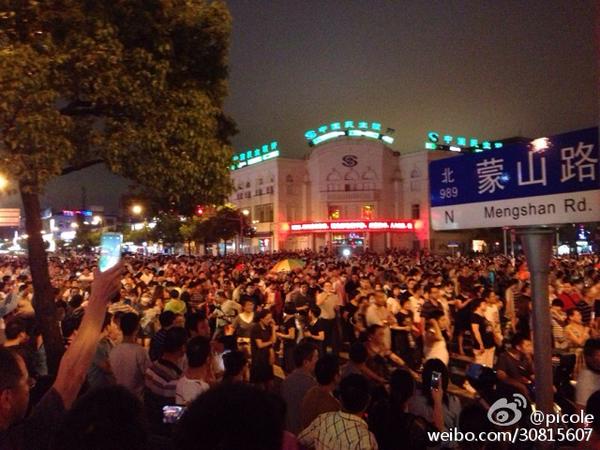Tens of thousands of residents from the Jinshan district of Shanghai city took to the streets over the course of a week, beginning June 22, to protest the government's plan to relocate a paraxylene (PX) plant to their neighborhood.
Armed police broke up the crowds this past weekend and forced the arrested to sign a “guarantee” that they would not rally against PX again. Chinese authorities also restricted Internet access and scrubbed social media of information about the protests.
With the idea of integrating the oil refining and chemical industry, Jinshan has been rezoned as a major site for the relocation of chemical factories from across Shanghai. To prepare for the new zoning plan, which the relocation of Pudong-based Gaoqiao oil refining factory to Jinshan would kick-start, authorities launched an environment assessment process, which is the last official step to implementing the integration plan.
In the past, a number of massive protests in major cities such as Dalian, Kunming and Xiamen have taken place against the construction of PX plants. Local residents were concerned about the air pollution caused by paraxylene, a by-product of the oil refining process and commonly used for producing plastic bottles and fiber which is toxic to humans.
To cool public anger, the government issued a statement on popular Chinese social media platform Weibo on June 26, calling for a stop to the environmental assessment of the relocation proposal. A large number of “cease-fire” banners were found on the streets, reportedly placed there by the government, saying:
環評終止了,一體化項目取消了,大家不要上街了。
The environmental assessment has been stopped. Integration project dropped. Don't take to the streets.
Determined to stop the project, tens of thousands still rallied in the streets over the weekend. The YouTube video below shows the weekend protest:
Thus far, the week-long protests have gone unreported in major mainland Chinese media outlets and witness accounts of the protests on Chinese Twitter-like Webio since June 23 have been erased. The remaining available sources of information come from overseas dissident news sites and social media platforms. @wickedonnaa has followed the news closely and reposted on Twitter information that was censored on Chinese social media since the beginning of the protests. Below are photos from the rally on June 26, before armed police began clamping down on the gathering:
6月26日,上海市金山区上万市民持续第5天游行抵制PX项目。[详:http://t.co/socrnalBwZ] pic.twitter.com/PvjUTIrq1I
— 非新聞 (@wickedonnaa) June 26, 2015
June 26, tens of thousands of people in Shanghai's Jinshan District on the fifth day of continued protests against the PX project. Details: http: //t.co/socrnalBwZ
One of those news sites, NTDTV, interviewed several protesters on June 29 about the police crackdown. A man named Shum said:
现在每天游行的人,三、四万人,都是晚上,星期六去市区抓人的,金山局长带头打人,更何况警察呢。22号地铁线星期六都停掉了,交警都在高速查大巴,只要是金山人,不管你是什么理由,直接给你押走。网路封了,图片一发过来就屏蔽了。
There are rallies every night, about 30,000-40,000 people in the streets. On Saturday, they arrested those who went downtown. The head of Jinshan district police took the lead in beating up people, other police officers were even more harsh. They suspended the operation of subway line 22 and the traffic police were checking people in the buses on the highway. Once they found out that you were a resident of Jinshan, they took you away. The Internet was blocked. The minute that photos were uploaded, they disappeared.
Another protester named Nie talked about the situation on June 27:
两千多名特警加19辆运警车在拦访,进出市区,高铁捷运、公交车凭身份证坐,金山人不让去的。早上7点到11点,傍晚5点11点,连续三天金山地区的网路限速,4G手机直接变成2G。
Around 2,000 armed police with about 19 police vehicles were stopping protesters from entering the city center [via major roads and highways]. People had to show their ID cards when taking high-speed trains, the metro, and public transportation. All Jinshan residents were banned from entering the city. Over the past three days, from 7 a.m. to 11 a.m. and 5 p.m. to 11 p.m., access to the Internet in Jinshan district has been restricted. 4G mobile became 2G mobile.
@wickedonnaa reposted photos from Weibo of the June 28 rally:
6月28日,上海万人反PX第7天。(详:http://t.co/BqOJCB8Dyb) pic.twitter.com/VtomkLDliz
— 非新聞 (@wickedonnaa) June 28, 2015
June 28, the seventh day anti-PX protest in Shanghai. Tens of thousands joined the rally.
Aggressive police crackdowns will probably put a damper on anti-PX protests for a while. But if Shanghai, a major petrochemical processing city in China, does not suspend the expansion of the petrochemical industry, the conflicts will carry on, a post from Chinese bridge blog Letscorp.net argued:
上海就成了中国的几大石化产业重镇之一,企业获得了利益,政府获得了税收,民众获得了少量的工作机会和大量的污染。
今天的上海民众,在工作机会和环境之间,毫不犹豫地选择了环境。民众们对石化产业的抵触情绪将越来越严重。上海政府必须面对这样的压力,必须在税收和民众的生存之间做出选择。
Shanghai has become a major city for China's petrochemical industry. The corporates receive benefits, the government receives tax income, while ordinary people don't have many employment opportunities but have to endure serious pollution.
Today's Shanghai residents will definitely choose the environment over job opportunities and are resentful of the petrochemical industry. The Shanghai government has to choose between their tax income and people's livelihoods.




